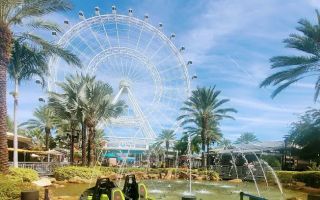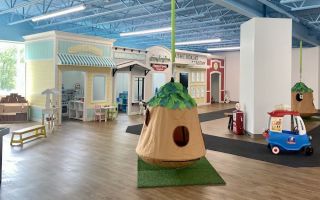Why Doesn't Atlanta Expand Amusement Parks?
Atlanta is known for its rich culture, history, and vibrant entertainment scene. However, when it comes to amusement parks, the city has relatively few compared to other major US cities. If you’ve ever wondered, "Why doesn't Atlanta expand amusement parks?" you’re not alone. Despite the city's growing population and tourism industry, expanding amusement park options has not been a significant focus. In this article, we’ll explore the reasons behind this phenomenon and look at the factors that influence amusement park development in Atlanta.

Fun Spot America Theme Parks - Kissimmee
2850 Florida Plaza Blvd, Kissimmee, FL 34746, USA
1. The Financial Challenge of Expanding Amusement Parks
One of the main reasons why Atlanta hasn't expanded its amusement park options is the financial burden that comes with such large-scale developments. Building an amusement park requires a significant initial investment, not only in terms of construction but also in infrastructure, staffing, and marketing. Unlike other types of entertainment venues, amusement parks require ongoing maintenance and upgrades to remain competitive. While cities like Orlando and Los Angeles benefit from established parks, Atlanta’s market size and demographic characteristics may not offer the same financial incentive for such large-scale projects.
For example, the cost of land in and around Atlanta, a rapidly growing metropolis, can be prohibitively high. Additionally, local governments often have to balance investments in a variety of sectors, such as education, healthcare, and transportation, making amusement park development less of a priority. This financial reality often leads to limited expansion options for large amusement parks in the area.

Fun Spot America Theme Parks — Atlanta
1675 GA-85, Fayetteville, GA 30214, USA
2. Competition from Nearby Cities
Another factor contributing to the limited growth of amusement parks in Atlanta is the stiff competition from nearby cities with established amusement park cultures. Cities like Orlando, Florida, and Chattanooga, Tennessee, are home to some of the most popular theme parks in the country. Orlando, in particular, is renowned for Walt Disney World, Universal Studios, and SeaWorld, which draw millions of tourists annually. With so much entertainment within a few hours' drive of Atlanta, it can be difficult to justify the financial risk of building a new amusement park in the area.
This regional competition also plays a role in shaping how tourism dollars are distributed across the southeastern United States. While Atlanta offers a range of entertainment options, from sporting events to cultural attractions, the concentration of theme parks in nearby cities makes it harder for Atlanta to secure large-scale amusement park investments.
3. Space Constraints and Urban Planning Challenges
Urban planning and the lack of available space for large-scale developments are also significant contributors to the absence of expanded amusement parks in Atlanta. As a major metropolitan area, Atlanta has limited available land for the construction of sprawling amusement park complexes. The city is already facing challenges related to traffic congestion, zoning regulations, and balancing residential and commercial development. As a result, space that would be ideal for an amusement park is often already taken by other businesses, residential areas, or infrastructure projects.
Urban sprawl can complicate the planning and execution of amusement park development, making it more difficult to find suitable locations for these types of projects. Moreover, any available space typically comes at a premium price, adding to the financial hurdles involved in starting a new theme park.
4. The Shift Toward Smaller, Niche Attractions
In recent years, there has been a noticeable shift in the types of attractions people seek. Rather than large, sprawling theme parks, many visitors prefer smaller, niche attractions that focus on specific interests or experiences. For example, Atlanta has seen an increase in the popularity of interactive exhibits, immersive entertainment venues, and more focused experiences, such as the Georgia Aquarium, the World of Coca-Cola, and the Atlanta Botanical Garden.
These smaller-scale attractions are often more financially viable and can cater to specific interests, allowing for greater customization in terms of the experience offered. This shift may reduce the demand for large amusement parks that offer general entertainment, making it harder for developers to justify such investments in Atlanta.
5. Focus on Other Types of Entertainment
In addition to competing with nearby cities, Atlanta's local government and businesses have also shifted their focus to other forms of entertainment. The city has heavily invested in sports venues, with stadiums like Mercedes-Benz Stadium and State Farm Arena attracting major sporting events and concerts. Furthermore, Atlanta has become a significant cultural hub, with museums, art galleries, and theaters offering a rich variety of activities for residents and tourists alike.
These forms of entertainment are often seen as more sustainable and have a more consistent visitor base compared to amusement parks, which rely on seasonal attendance and high initial investments. The focus on diversifying entertainment options has left limited room for new amusement park developments.
6. The Environmental and Social Impact of Amusement Parks
The environmental and social impacts of large amusement parks also cannot be ignored. The construction and operation of an amusement park require a significant amount of resources and energy. Additionally, such developments often face opposition from local communities and environmentalists who are concerned about the potential disruption to local ecosystems, wildlife habitats, and existing infrastructure.
In a time when sustainability is becoming an increasing concern for both businesses and consumers, these environmental considerations play a key role in the decision to pursue or reject amusement park expansions. Developers may be deterred from undertaking projects that could have a large-scale ecological impact, especially when alternatives such as eco-friendly, smaller attractions are gaining in popularity.
Conclusion: Is the Future of Atlanta's Amusement Parks in Limbo?
While Atlanta is a city full of excitement and attractions, the expansion of amusement parks remains a complex and challenging issue. From financial concerns to competition from nearby cities and space constraints, there are many factors that play a role in limiting the growth of theme parks in the area. However, as the demand for smaller, more specialized attractions continues to rise, there may be room for growth in other areas of the entertainment industry.
Whether Atlanta will see the addition of new amusement parks in the future is uncertain, but the city's focus on alternative forms of entertainment suggests that there are other ways to meet the needs of residents and tourists alike. If you're looking to explore other entertainment options in Atlanta, there are plenty of exciting experiences to be had—whether at one of the city's cultural landmarks or through its thriving sports and entertainment scene.



































